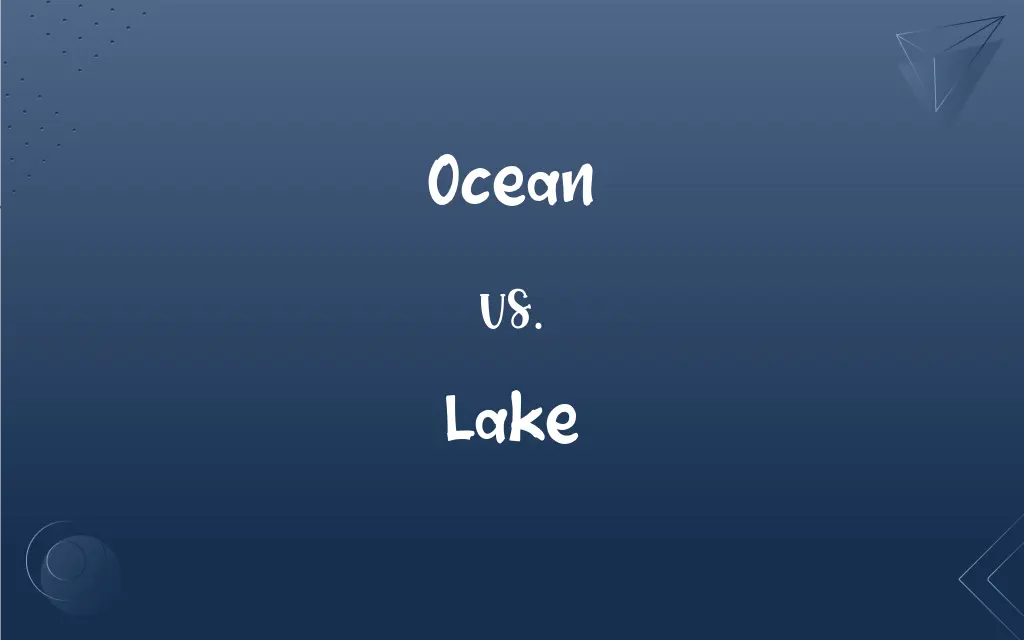Ocean vs. Lake: What's the Difference?
Edited by Aimie Carlson || By Harlon Moss || Published on April 2, 2024
An ocean is a vast, saline body of water covering most of the Earth's surface, whereas a lake is a smaller, typically freshwater body surrounded by land.

Key Differences
Oceans are immense bodies of saltwater that cover approximately 71% of the Earth's surface, encompassing a global scale. Lakes, in contrast, are smaller, localized bodies of water, either freshwater or saline, surrounded by land.
Oceans are characterized by their saltwater environment, an essential aspect of the marine ecosystem. Lakes generally consist of freshwater, although some, like the Great Salt Lake, are saline.
The ocean supports a vast and diverse range of marine life, from microscopic plankton to the largest whales. Lakes host ecosystems that are generally less diverse than oceans but are significant in their own right, supporting various fish species and aquatic plants.
Oceans play a crucial role in global trade, travel, and climate regulation. Lakes are often central to local economies and recreation, offering freshwater resources, fishing, and tourism opportunities.
Oceans are vital for Earth's climate and weather systems, influencing global patterns. Lakes contribute to local ecosystems, providing habitats and influencing microclimates.
ADVERTISEMENT
Comparison Chart
Size
Vast, covering large portions of Earth
Smaller, contained within a land area
Salinity
Predominantly saline
Usually freshwater, sometimes saline
Ecosystem Diversity
Highly diverse, global scale
Less diverse, local scale
Human Interaction
Global trade, climate influence
Local economy, recreation
Water Movement
Dynamic currents, tides
Generally calmer, less movement
ADVERTISEMENT
Ocean and Lake Definitions
Ocean
An ocean is a principal component of Earth's hydrosphere, supporting diverse marine life.
The ocean's depths are home to mysterious and diverse creatures.
Lake
A lake is an inland body of relatively still water, often a habitat for various species.
The lake teemed with fish, making it a popular spot for anglers.
Ocean
An ocean is a large, continuous body of saltwater, separate from smaller seas and gulfs.
The Atlantic Ocean is known for its unique currents and weather patterns.
Lake
A lake is a natural or artificial water body, smaller than an ocean.
The artificial lake in the park serves as a tranquil spot for picnics and walks.
Ocean
An ocean serves as a critical regulator of Earth's climate and weather systems.
Ocean currents play a vital role in determining the climate of coastal regions.
Lake
A lake is a large body of water surrounded by land, usually freshwater.
Lake Superior, one of the Great Lakes, is known for its clear, cold waters.
Ocean
An ocean is a key route for international maritime navigation and trade.
The Indian Ocean has been a major maritime trade route for centuries.
Lake
A lake often serves as a source of water for irrigation, drinking, and other human activities.
The local community relies on the lake for their freshwater supply.
Ocean
An ocean is a vast body of saltwater covering a major part of the Earth's surface.
The Pacific Ocean is the largest and deepest of the Earth's oceanic divisions.
Lake
A lake can be a key feature in local climate and weather patterns.
The lake effect snow is a common phenomenon in regions near large lakes.
Ocean
The entire body of salt water that covers more than 70 percent of the earth's surface.
Lake
A large inland body of fresh water or salt water.
Ocean
Abbr. Oc. or O. Any of the principal divisions of the ocean, including the Atlantic, Pacific, Indian, Arctic, and Southern Oceans.
Lake
A scenic pond, as in a park.
FAQs
Can lakes have tides like oceans?
Very large lakes can have small tides, but they are much less pronounced than ocean tides.
What kind of ecosystems do oceans support?
Oceans support a wide range of marine ecosystems, from coral reefs to deep-sea trenches.
Are oceans important for climate?
Yes, oceans play a critical role in regulating the Earth's climate.
How does the biodiversity of lakes compare to oceans?
Oceans have a higher biodiversity due to their size and varied habitats.
What is the primary difference between an ocean and a lake?
The primary difference is size and salinity; oceans are vast and saline, while lakes are smaller and usually freshwater.
What is the deepest lake?
Lake Baikal in Russia is the world's deepest and oldest freshwater lake.
Can lakes be saltwater?
Yes, some lakes, like the Great Salt Lake, are saline.
Are all lakes freshwater?
No, while many lakes are freshwater, some are saline.
Are there freshwater organisms in lakes?
Yes, lakes support a variety of freshwater organisms, including fish, plants, and invertebrates.
What human activities are common in lakes?
Fishing, recreation, and freshwater supply are common lake activities.
Can lakes be man-made?
Yes, many lakes are man-made, often created by damming rivers for water supply or recreation.
What is the largest ocean?
The Pacific Ocean is the largest and deepest ocean.
Do oceans have a role in the carbon cycle?
Yes, oceans play a vital role in the global carbon cycle, absorbing carbon dioxide from the atmosphere.
How do lakes affect local climates?
Lakes can influence local climates by moderating temperatures and increasing humidity.
Can lakes disappear over time?
Yes, lakes can disappear due to natural processes like drought or human activities like water extraction.
Are there endangered species in oceans and lakes?
Both oceans and lakes have endangered species, often due to factors like pollution, overfishing, and habitat loss.
Do oceans influence weather patterns?
Yes, oceans significantly influence global and regional weather patterns.
How are lakes formed?
Lakes can form naturally by glacial activity, tectonic movements, or artificially by damming rivers.
Why are oceans salty?
Oceans are salty due to the accumulation of minerals and salts washed from the land over time.
What is the significance of ocean currents?
Ocean currents are crucial for distributing heat, nutrients, and marine life across the globe.
About Author
Written by
Harlon MossHarlon is a seasoned quality moderator and accomplished content writer for Difference Wiki. An alumnus of the prestigious University of California, he earned his degree in Computer Science. Leveraging his academic background, Harlon brings a meticulous and informed perspective to his work, ensuring content accuracy and excellence.
Edited by
Aimie CarlsonAimie Carlson, holding a master's degree in English literature, is a fervent English language enthusiast. She lends her writing talents to Difference Wiki, a prominent website that specializes in comparisons, offering readers insightful analyses that both captivate and inform.































































